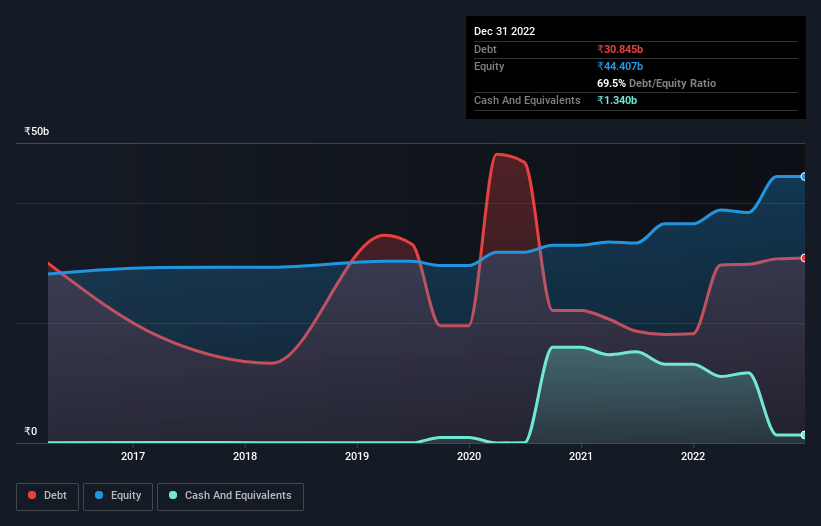Rashtriya Chemicals and Fertilizers (NSE:RCF) Has A Pretty Healthy Balance Sheet
Legendary fund manager Li Lu (who Charlie Munger backed) once said, 'The biggest investment risk is not the volatility of prices, but whether you will suffer a permanent loss of capital.' It's only natural to consider a company's balance sheet when you examine how risky it is, since debt is often involved when a business collapses. We note that Rashtriya Chemicals and Fertilizers Limited (NSE:RCF) does have debt on its balance sheet. But should shareholders be worried about its use of debt?
When Is Debt Dangerous?
Generally speaking, debt only becomes a real problem when a company can't easily pay it off, either by raising capital or with its own cash flow. Ultimately, if the company can't fulfill its legal obligations to repay debt, shareholders could walk away with nothing. However, a more usual (but still expensive) situation is where a company must dilute shareholders at a cheap share price simply to get debt under control. Of course, the upside of debt is that it often represents cheap capital, especially when it replaces dilution in a company with the ability to reinvest at high rates of return. When we examine debt levels, we first consider both cash and debt levels, together.
View our latest analysis for Rashtriya Chemicals and Fertilizers
What Is Rashtriya Chemicals and Fertilizers's Net Debt?
The image below, which you can click on for greater detail, shows that at September 2022 Rashtriya Chemicals and Fertilizers had debt of ₹30.8b, up from ₹18.2b in one year. On the flip side, it has ₹1.34b in cash leading to net debt of about ₹29.5b.

A Look At Rashtriya Chemicals and Fertilizers' Liabilities
Zooming in on the latest balance sheet data, we can see that Rashtriya Chemicals and Fertilizers had liabilities of ₹70.5b due within 12 months and liabilities of ₹15.2b due beyond that. Offsetting these obligations, it had cash of ₹1.34b as well as receivables valued at ₹42.6b due within 12 months. So its liabilities total ₹41.8b more than the combination of its cash and short-term receivables.
This deficit is considerable relative to its market capitalization of ₹58.0b, so it does suggest shareholders should keep an eye on Rashtriya Chemicals and Fertilizers' use of debt. This suggests shareholders would be heavily diluted if the company needed to shore up its balance sheet in a hurry.
In order to size up a company's debt relative to its earnings, we calculate its net debt divided by its earnings before interest, tax, depreciation, and amortization (EBITDA) and its earnings before interest and tax (EBIT) divided by its interest expense (its interest cover). This way, we consider both the absolute quantum of the debt, as well as the interest rates paid on it.
Rashtriya Chemicals and Fertilizers's net debt of 1.8 times EBITDA suggests graceful use of debt. And the fact that its trailing twelve months of EBIT was 8.7 times its interest expenses harmonizes with that theme. Notably, Rashtriya Chemicals and Fertilizers's EBIT launched higher than Elon Musk, gaining a whopping 101% on last year. There's no doubt that we learn most about debt from the balance sheet. But it is Rashtriya Chemicals and Fertilizers's earnings that will influence how the balance sheet holds up in the future. So when considering debt, it's definitely worth looking at the earnings trend. Click here for an interactive snapshot.
Finally, a company can only pay off debt with cold hard cash, not accounting profits. So it's worth checking how much of that EBIT is backed by free cash flow. In the last three years, Rashtriya Chemicals and Fertilizers's free cash flow amounted to 41% of its EBIT, less than we'd expect. That weak cash conversion makes it more difficult to handle indebtedness.
Our View
When it comes to the balance sheet, the standout positive for Rashtriya Chemicals and Fertilizers was the fact that it seems able to grow its EBIT confidently. But the other factors we noted above weren't so encouraging. For instance it seems like it has to struggle a bit to handle its total liabilities. When we consider all the elements mentioned above, it seems to us that Rashtriya Chemicals and Fertilizers is managing its debt quite well. Having said that, the load is sufficiently heavy that we would recommend any shareholders keep a close eye on it. The balance sheet is clearly the area to focus on when you are analysing debt. However, not all investment risk resides within the balance sheet - far from it. For example, we've discovered 3 warning signs for Rashtriya Chemicals and Fertilizers (1 is significant!) that you should be aware of before investing here.
If, after all that, you're more interested in a fast growing company with a rock-solid balance sheet, then check out our list of net cash growth stocks without delay.
New: AI Stock Screener & Alerts
Our new AI Stock Screener scans the market every day to uncover opportunities.
• Dividend Powerhouses (3%+ Yield)
• Undervalued Small Caps with Insider Buying
• High growth Tech and AI Companies
Or build your own from over 50 metrics.
Have feedback on this article? Concerned about the content? Get in touch with us directly. Alternatively, email editorial-team (at) simplywallst.com.
This article by Simply Wall St is general in nature. We provide commentary based on historical data and analyst forecasts only using an unbiased methodology and our articles are not intended to be financial advice. It does not constitute a recommendation to buy or sell any stock, and does not take account of your objectives, or your financial situation. We aim to bring you long-term focused analysis driven by fundamental data. Note that our analysis may not factor in the latest price-sensitive company announcements or qualitative material. Simply Wall St has no position in any stocks mentioned.
About NSEI:RCF
Rashtriya Chemicals and Fertilizers
Manufactures, markets, and sells fertilizers and industrial chemicals in India.
Excellent balance sheet with proven track record.
Market Insights
Community Narratives




